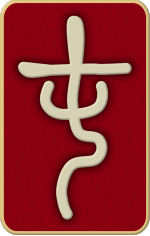
屯 Zhūn Slow progress (Inhibition) [hexagram 3]


Water over Thunder
 Water element
Water element
Lunar month: 12 ; Host (controlling) line : 1
The Decision
A delicate seedling heralds a good beginning. Moving forward with firm resolve and earnestness. Any undertaking should not be taken lightly. Others will aid you.
Difficulties arise at the beginning. Steadfast action brings progress and success. Thunder and rain create everything. Creation is complex and uncertain. Even with the help of others the future is not yet secured.
屯: 元亨, 利贞, 勿用有攸往, 利建侯. Tún: yuán hēng, lì zhēn, wù yòng yǒu yōu wǎng, lì jiàn hóu.
彖传: 屯, 刚柔始交而难生, 动乎险中, 大亨贞. 雷雨之动满盈, 天造草昧, 宜建侯而不宁. Tuàn zhuàn: Tún, gāng róu shǐ jiāo ér nán shēng, dòng hū xiǎn zhōng, dà hēng zhēn. léi yǔ zhī dòng mǎn yíng, tiān zào cǎo mèi, yí jiàn hóu ér bù níng.
The Image
Cloud and Thunder. It is advantageous to plan and set affairs in order.
象传: 云, 雷, 屯; 君子以经纶. Xiàng zhuàn: Yún, léi, tún; jūn zǐ yǐ jīng lún.
Line Change 1
Progress is hindered. Remain steadfast and resolute. Seek assistance from others.
‘Progress is hindered’ but intentions are good. Helping those less fortunate will gain honor.
初九: 磐桓; 利居贞, 利建侯. Chū jiǔ: pán huán; lì jū zhēn, lì jiàn hóu.
象传: 虽磐桓, 志行正也. 以贵下贱, 大得民也. Xiàng zhuàn: Suī pán huán, zhì háng zhēng yě. yǐ guì xià jiàn, dà dé mín yě.
Line Change 2
Progress in blocked, seemingly going backwards. Pledge to marry yet the loved one refuses but will later accept in ten years.
Second six denotes difficulties. Hardship ends after ten years and then normal life can resume.
六二: 屯如邅如, 乘马班如. 匪寇婚媾, 女子贞不字, 十年乃字. Liù èr: tún rú zhān rú, chéng mǎ bān rú. Fěi kòu hūn gòu, nǚ zǐ zhēn bù zì, shí nián nǎi zì.
象传: 六二之难, 乘刚也. 十年乃字, 反常也. Xiàng zhuàn: Liù èr zhī nán, chéng gāng yě. shí nián nǎi zì, fǎn cháng yě.
Line Change 3
Lost in a forest chasing deer without a guide. It is wise to be aware of hidden danger, it is better to withdraw because pursuit will not be successful.
‘Chasing deer without a guide’ – arose from following the thrill of the chase; continuation would only lead to regret.
六三: 即鹿无虞, 惟入于林中, 君子几不如舍, 往吝. Liù sān: jí lù wú yú, wéi rù yú lín zhōng, jūn zǐ jī bù rú shè, wǎng lìn.
象传: 即鹿无虞, 以纵禽也. 君子舍之, 往吝穷也. Xiàng zhuàn: Jí lù wú yú, yǐ zòng qín yě. Jūn zǐ shè zhī, wǎng lìn qióng yě.
Line Change 4
The loved one appears to be traveling away; assistance will bring together and all will then turn out well.
Seeking help before continuing shows wisdom.
六四: 乘马班如, 求婚媾, 往吉, 无不利. Liù sì: chéng mǎ bān rú, qiú hūn gòu, wǎng jí, wú bù lì.
象传: 求而往, 明也. Xiàng zhuàn: Qiú ér wǎng, míng yě.
Line Change 5
Magnanimity is difficult. Remaining resolute in small actions will bring success but in great actions brings misfortune.
Generosity requires effort but reward will not be immediate.
九五: 屯其膏, 小贞吉, 大贞凶. Jiǔ wǔ: tún qí gāo, xiǎo zhēn jí, dà zhēn xiōng.
象传: 屯其膏, 施未光也. Xiàng zhuàn: Tún qí gāo, shī wèi guāng yě.
Line Change 6
Forced to retreat. Sorrowful and cut to the quick.
‘Cut to the quick’ – how long can this go on?
上六: 乘马班如, 泣血涟如. Shǎng liù: chéng mǎ bān rú, qì xuè lián rú.
象传: 泣血涟如, 何可长也. Xiàng zhuàn: Qì xuè lián rú, hé kě cháng yě.
The full set of 64 English translations is available in our new book 'Book of Changes - Deciphered' ➚.